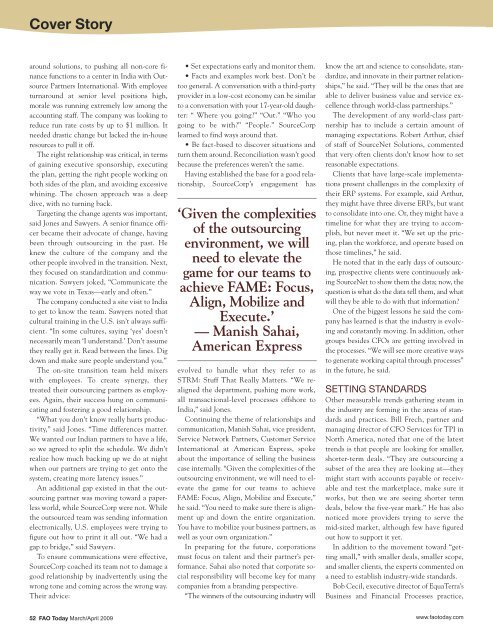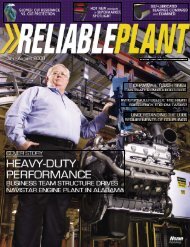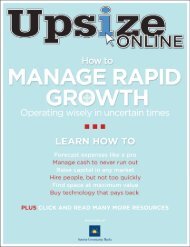March/April 2009 www.FAOToday.com
March/April 2009 www.FAOToday.com
March/April 2009 www.FAOToday.com
You also want an ePaper? Increase the reach of your titles
YUMPU automatically turns print PDFs into web optimized ePapers that Google loves.
Cover Story<br />
around solutions, to pushing all non-core finance<br />
functions to a center in India with Outsource<br />
Partners International. With employee<br />
turnaround at senior level positions high,<br />
morale was running extremely low among the<br />
accounting staff. The <strong>com</strong>pany was looking to<br />
reduce run rate costs by up to $1 million. It<br />
needed drastic change but lacked the in-house<br />
resources to pull it off.<br />
The right relationship was critical, in terms<br />
of gaining executive sponsorship, executing<br />
the plan, getting the right people working on<br />
both sides of the plan, and avoiding excessive<br />
whining. The chosen approach was a deep<br />
dive, with no turning back.<br />
Targeting the change agents was important,<br />
said Jones and Sawyers. A senior finance officer<br />
became their advocate of change, having<br />
been through outsourcing in the past. He<br />
knew the culture of the <strong>com</strong>pany and the<br />
other people involved in the transition. Next,<br />
they focused on standardization and <strong>com</strong>munication.<br />
Sawyers joked, “Communicate the<br />
way we vote in Texas—early and often.”<br />
The <strong>com</strong>pany conducted a site visit to India<br />
to get to know the team. Sawyers noted that<br />
cultural training in the U.S. isn’t always sufficient.<br />
“In some cultures, saying ‘yes’ doesn’t<br />
necessarily mean ‘I understand.’ Don’t assume<br />
they really get it. Read between the lines. Dig<br />
down and make sure people understand you.”<br />
The on-site transition team held mixers<br />
with employees. To create synergy, they<br />
treated their outsourcing partners as employees.<br />
Again, their success hung on <strong>com</strong>municating<br />
and fostering a good relationship.<br />
“What you don’t know really hurts productivity,”<br />
said Jones. “Time differences matter.<br />
We wanted our Indian partners to have a life,<br />
so we agreed to split the schedule. We didn’t<br />
realize how much backing up we do at night<br />
when our partners are trying to get onto the<br />
system, creating more latency issues.”<br />
An additional gap existed in that the outsourcing<br />
partner was moving toward a paperless<br />
world, while SourceCorp were not. While<br />
the outsourced team was sending information<br />
electronically, U.S. employees were trying to<br />
figure out how to print it all out. “We had a<br />
gap to bridge,” said Sawyers.<br />
To ensure <strong>com</strong>munications were effective,<br />
SourceCorp coached its team not to damage a<br />
good relationship by inadvertently using the<br />
wrong tone and <strong>com</strong>ing across the wrong way.<br />
Their advice:<br />
• Set expectations early and monitor them.<br />
• Facts and examples work best. Don’t be<br />
too general. A conversation with a third-party<br />
provider in a low-cost economy can be similar<br />
to a conversation with your 17-year-old daughter:<br />
“ Where you going?” “Out.” “Who you<br />
going to be with?” “People.” SourceCorp<br />
learned to find ways around that.<br />
• Be fact-based to discover situations and<br />
turn them around. Reconciliation wasn’t good<br />
because the preferences weren’t the same.<br />
Having established the base for a good relationship,<br />
SourceCorp’s engagement has<br />
‘Given the <strong>com</strong>plexities<br />
of the outsourcing<br />
environment, we will<br />
need to elevate the<br />
game for our teams to<br />
achieve FAME: Focus,<br />
Align, Mobilize and<br />
Execute.’<br />
— Manish Sahai,<br />
American Express<br />
evolved to handle what they refer to as<br />
STRM: Stuff That Really Matters. “We realigned<br />
the department, pushing more work,<br />
all transactional-level processes offshore to<br />
India,” said Jones.<br />
Continuing the theme of relationships and<br />
<strong>com</strong>munication, Manish Sahai, vice president,<br />
Service Network Partners, Customer Service<br />
International at American Express, spoke<br />
about the importance of selling the business<br />
case internally. “Given the <strong>com</strong>plexities of the<br />
outsourcing environment, we will need to elevate<br />
the game for our teams to achieve<br />
FAME: Focus, Align, Mobilize and Execute,”<br />
he said. “You need to make sure there is alignment<br />
up and down the entire organization.<br />
You have to mobilize your business partners, as<br />
well as your own organization.”<br />
In preparing for the future, corporations<br />
must focus on talent and their partner’s performance.<br />
Sahai also noted that corporate social<br />
responsibility will be<strong>com</strong>e key for many<br />
<strong>com</strong>panies from a branding perspective.<br />
“The winners of the outsourcing industry will<br />
know the art and science to consolidate, standardize,<br />
and innovate in their partner relationships,”<br />
he said. “They will be the ones that are<br />
able to deliver business value and service excellence<br />
through world-class partnerships.”<br />
The development of any world-class partnership<br />
has to include a certain amount of<br />
managing expectations. Robert Arthur, chief<br />
of staff of SourceNet Solutions, <strong>com</strong>mented<br />
that very often clients don’t know how to set<br />
reasonable expectations.<br />
Clients that have large-scale implementations<br />
present challenges in the <strong>com</strong>plexity of<br />
their ERP systems. For example, said Arthur,<br />
they might have three diverse ERPs, but want<br />
to consolidate into one. Or, they might have a<br />
timeline for what they are trying to ac<strong>com</strong>plish,<br />
but never meet it. “We set up the pricing,<br />
plan the workforce, and operate based on<br />
those timelines,” he said.<br />
He noted that in the early days of outsourcing,<br />
prospective clients were continuously asking<br />
SourceNet to show them the data; now, the<br />
question is what do the data tell them, and what<br />
will they be able to do with that information?<br />
One of the biggest lessons he said the <strong>com</strong>pany<br />
has learned is that the industry is evolving<br />
and constantly moving. In addition, other<br />
groups besides CFOs are getting involved in<br />
the processes. “We will see more creative ways<br />
to generate working capital through processes”<br />
in the future, he said.<br />
SETTING STANDARDS<br />
Other measurable trends gathering steam in<br />
the industry are forming in the areas of standards<br />
and practices. Bill Frech, partner and<br />
managing director of CFO Services for TPI in<br />
North America, noted that one of the latest<br />
trends is that people are looking for smaller,<br />
shorter-term deals. “They are outsourcing a<br />
subset of the area they are looking at—they<br />
might start with accounts payable or receivable<br />
and test the marketplace, make sure it<br />
works, but then we are seeing shorter term<br />
deals, below the five-year mark.” He has also<br />
noticed more providers trying to serve the<br />
mid-sized market, although few have figured<br />
out how to support it yet.<br />
In addition to the movement toward “getting<br />
small,” with smaller deals, smaller scope,<br />
and smaller clients, the experts <strong>com</strong>mented on<br />
a need to establish industry-wide standards.<br />
Bob Cecil, executive director of EquaTerra’s<br />
Business and Financial Processes practice,<br />
52 FAO Today <strong>March</strong>/<strong>April</strong> <strong>2009</strong> <strong>www</strong>.faotoday.<strong>com</strong>
















